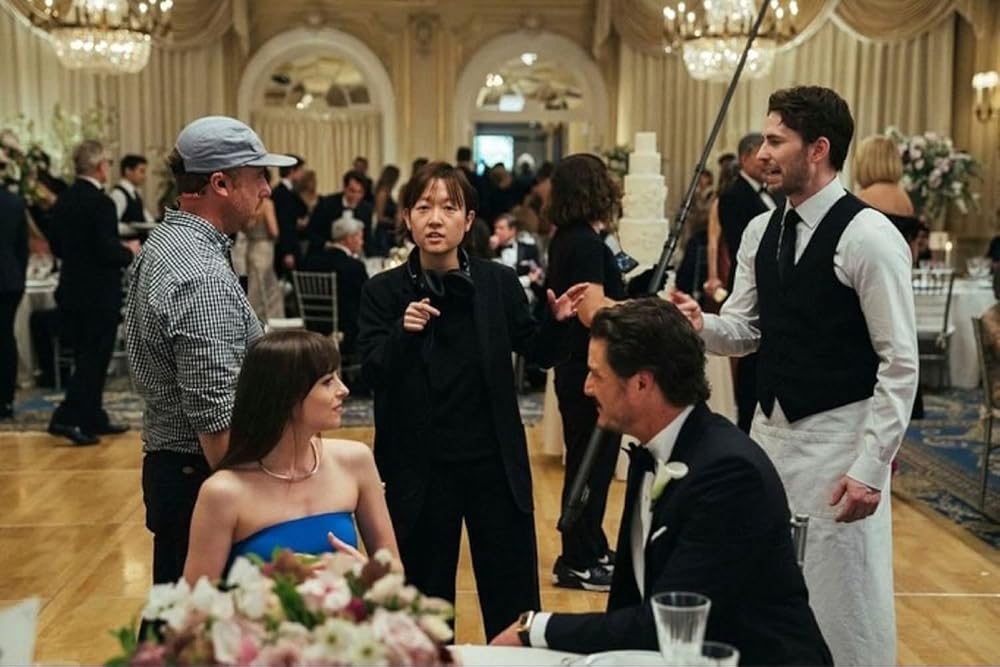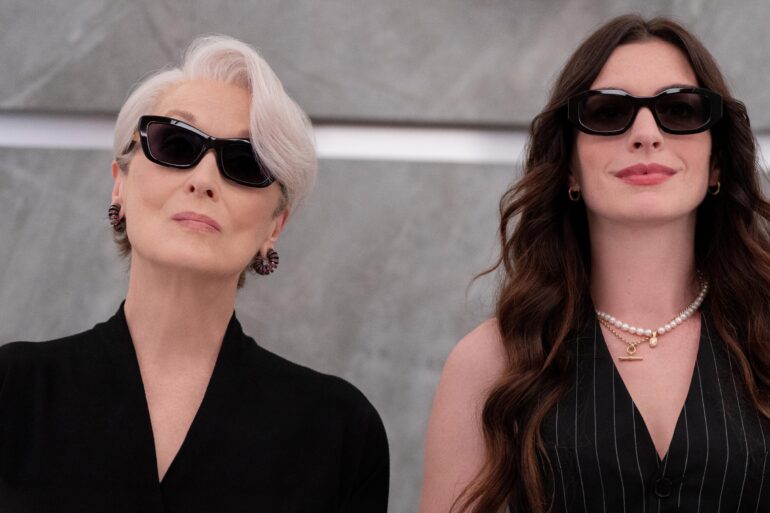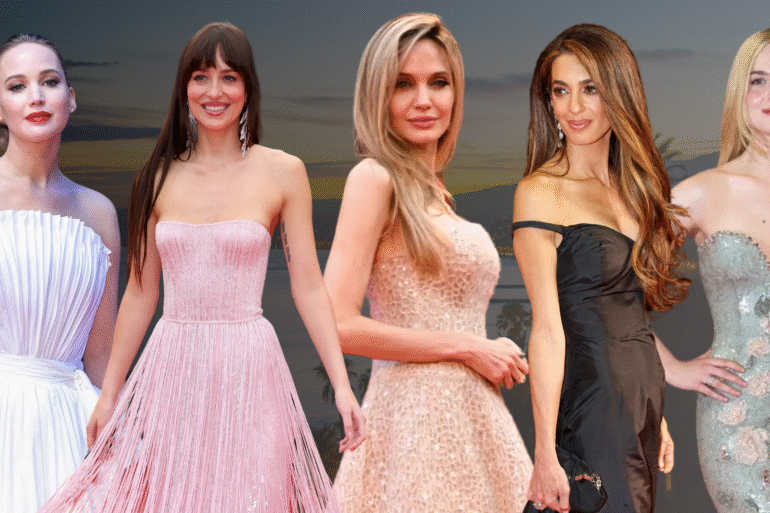The film doesn’t make Harry the villain or John the saint. Instead, it shows how modern dating culture often makes us think about love in terms of status, stability, and long-term returns.
Celine Song’s new film Materialists starts the way most romcom fantasies do: a glamorous wedding in New York. Dakota Johnson’s Lucy, known for pairing up the city’s most eligible singles, is the matchmaker who made it happen. She’s sharp, put-together, and used to being around people with money.
That night, she meets two men who will pull her in very different directions: Harry (played by Pedro Pascal), a wealthy fund manager who seems almost too good to be true, and John (Chris Evans), her ex-boyfriend who’s struggling to make rent and works as an actor and a waiter in a catering business.
From there, the story becomes a classic love triangle but with a very modern twist. One man offers penthouses, five-star dinners, and security. The other offers history, affection, and a reminder of who Lucy used to be. It’s a setup we’ve seen before, but here, the question isn’t just “Who will she choose?” It’s “Why do we choose the way we do?”
Related story: No second chances: Is the ‘cut them off’ dating trend too harsh or just clear?
Related story: Finding Cupid? Here’s how Viber Dating lets you feel the spark and skip the scam
Related story: Are Filipino millennials more hopeful about marriage than their Asian counterparts?



Dating like it’s a business deal
Song’s New York is far from the bubbly, carefree city of Sex and the City. In Materialists, dating feels like a high-stakes negotiation. Lucy’s job at a matchmaking company isn’t about sparks but about ticking boxes: income, age, height, family background. Her clients talk about love the same way they’d talk about an investment. Even Harry uses the language of business, complimenting Lucy on her “immaterial assets.”
The film doesn’t make Harry the villain or John the saint. Instead, it shows how modern dating culture often makes us think about love in terms of status, stability, and long-term returns. Song knows this world well (she once worked as a matchmaker.)
A romcom with sharper edges
If you’re expecting Materialists to feel like Song’s previous hit Past Lives, you might want to think again. This one is a bit colder but underneath, it’s closer to a drama than a feel-good romcom. There’s no kilig meet-cute, no over-the-top fight between rivals. Just quiet, sometimes uncomfortable conversations about what we want from the people we love.
Some critics have said the ending (where love wins over money) feels like a traditional rom-com wrap-up. But the way Song stages it, it’s not a “happily ever after.” It’s more like something that will leave the audience to think. A choice that’s satisfying in some ways but still leaves questions hanging.
I found myself wondering why Lucy still chose John. Despite being ambitious, she wanted more out of life. There’s a scene where she tells him she hates him because he’s poor but admits she hates herself more for feeling that way. In hindsight, she’s just a woman who wants to be with someone financially stable because she sees a future with him. She did like Harry, and Harry clearly liked her too (he was ready to go all in!) but she knew she wasn’t in love with him.
Related story: Click, swipe, block: How my two-year virtual ‘relationship’ crashed
Related story: Why do some relationships work and others don’t?



The ending might feel predictable (or maybe it’s because Chris Evans still has that boy-next-door charm, complete with those gentle, loving eyes), but it also reads as John realizing he needs to step up. Being in a relationship with someone like Lucy means meeting her halfway, not just emotionally, but in building a life together.



The debate the film can’t escape
After early screenings, some online reactions called the film “broke man propaganda”. In an interview with Refinery29, Song called the term “very cruel” and pointed out how classist it is to treat poverty as a personal failure. “I think that is a very troubling result of the way that the wealthy people have gotten into our hearts about how it’s your fault if you’re poor, you’re a bad person if you’re poor. So it doesn’t make me laugh, actually,” she said. “It makes me feel very concerned that anybody would talk about my movie and my characters and to really think about it in such classist terms. The whole movie is about fighting the way that capitalism is trying to colonize our hearts and colonize love.”
That’s the part of Materialists that makes it more than just a love triangle. It’s not just about choosing between two eligible men. It’s about whether we’ve been taught (consciously or not) to value financial security above everything else in a relationship.
On a personal note
Here’s the thing: Materialists isn’t for everyone. If you’re after the warm, escapist high of a classic romcom, the film’s cool, slow-burn style might feel distant. But for me, I personally liked it. It’s not trying to make you swoon every ten minutes but it’s making you think about how we date now.
We live in a time when swiping left or right is as quick as rejecting an apartment listing. We filter potential partners by job, lifestyle, and “future potential” before we even let ourselves feel something. And somewhere along the way, we’ve started confusing material investment with emotional investment believing that someone spending more money on us must love us more.
How often do we swipe past someone because their job title isn’t impressive enough? How often do we mistake big, expensive gestures for deeper commitment? Somewhere along the way, we started treating love as something like a checklist to complete instead of an emotion to be felt.



Song doesn’t dismiss the role money plays in relationships. Of course it matters! It shapes our choices and our futures. But she reminds us that real love doesn’t follow a checklist or a spreadsheet. It’s often inconvenient, unprofitable, and completely illogical. And when it’s healthy and mutual, that’s exactly what makes it worth holding on to. Not at the cost of your safety or self-respect, but because it’s one of the few things in life that can’t be measured in numbers.
I kept thinking that Materialists is not a fairytale but a reality check. And maybe even a gateway to reassess the way we see love, money, and the messy choices we make in between.
Related story: REVIEW: Disney’s ‘Freakier Friday’ brings chaos, nostalgia, and all the feels
Related story: ‘The Gilded Age’—and the reasons why we’re hooked on this show
Related story: Why ‘My Best Friend’s Wedding’ sequel, still in development, feels right for right now








